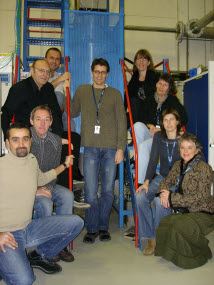
|
They all take part in the EU project: Roger Khalil (left), Willy Horrigmo, Edvard Karlsvik, Morten Grønli, prosjektleder Lars Sørum, Mette Bugge, Bodil J. Sætherskar, Anne Marie Storholt og Torild Buarø. |
The project is the largest ever undertaken by the EU in the bioenergy field.
SINTEF is leading a group of participants which comprises research and development groups, the equipment industry and owners of combustion plants from seven countries - a total of 15 members.
The largest part of the project concerns with combustion plants that recover energy from waste products. The aim is to develop technology to improve the efficiency of plants of this type. The project also intends to turn a larger proportion of the ash into a usable resource.
Timber and waste
Bioenergy is produced by burning either pure timber such as shavings and offcuts, or waste. The energy liberated can be utilised in the form of heat, such as district heating, or as energy generated in power plants.
Among other goals, the EU project aims to utilise a larger proportion of Europe’s bioenergy in the form of electricity. The project will also offer solutions that will allow the use of cheaper, poorer-quality timber than is used today, while producing just as much energy as at present.
Sustainable development
Timber is a renewable resource. Burning timber does not contribute to the greenhouse effect as long as the outtake from the forest does not exceed regrowth. As long as this does not happen, the CO2 liberated by combustion will be absorbed by new tree growth.
This is also true of most waste. Environmental estimates are that 75% of waste
consists of products that originated in forests or cultivated soils. This component of waste is thus a renewable resource, and therefore neutral in terms of the greenhouse effect - as long as our forests are not overexploited.
Already, two-thirds of all the renewable energy generated in Europe is bioenergy. By focusing on improving efficiency and cost-cutting, the EU project aims to encourage further development of bioenergy plants,
Part of EU environmental policy
The project has its background in two of the EU’s core environmental goals:
• The proportion of European energy generated by renewable energy sources should rise from the current figure of six percent to 12% by 2010.
• At the same time, “green” electricity generation is to rise from 14% to 21% of total energy production.
More research on bioenergy is one of the measures being adopted by the EU to reach these goals.
Full-scale results
The participants will base their work on technology that has already been tested at laboratory scale. The project will raise this to full scale by retrofitting existing combustion plants. The fruits of the project will be usable by both old and new plants.
Two Norwegian participants
The EU Commission is putting NOK 100 million into the project, while industry’s contribution will be MNOK 130, to which MNOK 20 in kind will be added. Some of this money will come from national research councils.
As well as managing the project, SINTEF will also participate directly in the research. The four-year project will purchase services from SINTEF worth some MNOK 16.
Trondheim Energy Company District Heating Ltd is a member of the project. Its district heating plant at Rosten in Trondheim will be studying the long-term effects of full-scale combustion of various qualities of biomass. The plant will also be used to demonstrate new control systems and to examine various methods for dealing with the ash residue of the combustion process.
By Svein Tønseth
Contact:
{DynamicContent:Ansatt link}, SINTEF Energy Research
